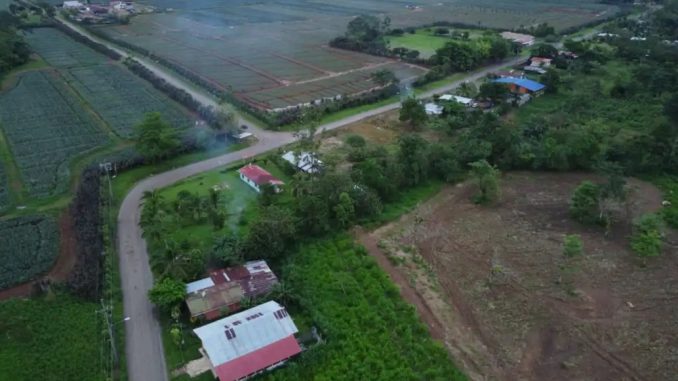
The pineapple pest threatens ecosystems, health and peasant production
By Grace Serrano
Las Brisas, in Canalete de Upala, is a small town made up of 47 houses and 50 families, inhabited by approximately one hundred and fifty people. It is located on the bank of the Guacalito River, on road 729 and 164. At this time, this town is going through a very difficult situation, due to the pollution produced by a piñera company.
Thirteen years ago, an agricultural company, Las Brisas SA, arrived in the community to grow citrus fruits, especially oranges. Because the company generated a source of employment, the population was initially pleased with the company’s arrival. However, after some time, the company sold its rights and the new owners, instead of continuing with the orange activity, began to grow pineapple. This implied clearing the area, to make way for pineapple production, many hectares of land that were previously forested areas and wetlands, in a huge and harmful monoculture.
Pineapple activity has a strong impact on the wetlands and rivers in the area. Much of the land that is now planted with pineapple was originally mountainous, forests, tacotales, lagoons, wetlands, rivers, river branches, creeks, and streams, which have been gradually disappearing. The problem is that the flow of these was very shallow, the channeling that is done to drain the planting area was destroying the wetlands and streams.
Over the course of these years, the company acquired more and more land and began to buy land from neighbors: small farms or farms that were dedicated to raising dairy or beef cattle, sheep, pigs, poultry, as well as crops such as rice, beans, corn, bananas, tiquisque, yucca, yams, and fruit trees such as avocado, mangoes, orange, lemon, and cashew, among others.
As we can see, the productive diversity of the area was enormous. With the disappearance of crops and livestock production, the social and economic growth of this community has also disappeared. The industrial pineapple monopoly is increasingly pushing the families of the area into a corner, and they are losing the freedom to decide what to produce on their own land. The large amount of agrochemicals and the pests that result from pineapple monoculture make agricultural production and domestic animal breeding difficult. Some of these agrochemicals are highly toxic and can harm not only the environment, but also human health. Among the diseases caused by agrochemicals are chronic respiratory diseases, such as asthma, allergies, rashes, severe coughs, headaches, vomiting, lung and kidney diseases, among others. There have already been several cases of poisoning of children in schools near the pineapple plantations, a subject we will refer to in another article, but one of the issues that has the people of the community of Las Brisas most concerned is that the pineapple company has just acquired a property adjacent to the community’s school and intends to plant it completely.
Pineapple stripping gives way to pests such as rodents and flies. In other communities where pineapples are grown, these flies cause serious diseases in livestock. Therefore, agricultural companies have tried to control them with plastic bags covered with molasses, but the problem is that these not only trap flies but also many wild birds, dragonflies, butterflies, bees, ladybugs, crickets, praying mantises, conguillos and an endless number of insects.

There is great concern in the area because with each expansion, the biodiversity that used to inhabit the area around the town is also disappearing. There are fewer and fewer magpies, golden orioles, parrots, parakeets, and a large number of birds, bats, monkeys, raccoons, wild boars, jaribús, pizote, sloths, herons, kingfishers, crags, and various waterfowl.
These impacts on the ecosystems and on the health of the people living in the communities is a very serious matter. This also devalues the price of the land, affects the social and economic growth of the area, and affects productive diversity; in the long run, this also leads to the emigration of young people in search of employment and better opportunities, as there are fewer and fewer job opportunities in Las Brisas due to the agricultural monopoly.
As stated previously, there is great concern for the possibility of poisoning, since the majority of the population is comprised of children and adults of old age. Miramar School is located a few meters from the cultivation area, also the Catholic Church and several houses are surrounded by pineapple. The community of Las Brisas urgently request the Municipality of Upala establish a regulating plan of the zone that stops now the pineapple activity. A town that has no opportunity of growing in social and economic terms, suffocated by a monopolist activity, is a town destined to disappear.
For the preservation of the ecosystems
For clean rivers
For a healthy environment
For air without agrotoxics
Stop the pineapple expansion








